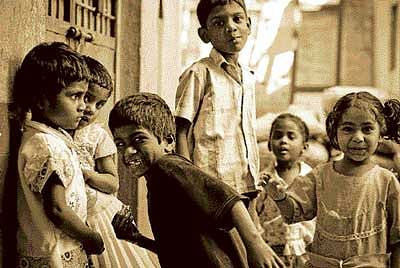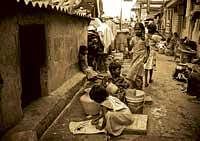
One of the pictures showed a girl child as young as just a year washing plates as a domestic worker, while a slightly older one was seen washing a stove at the kitchen wearing her school uniform in the other. A third showed happy children playing in the street, oblivious to the overflowing drainage close by.
The plight of slum children portrayed in the photo exhibition was arranged as part of the national conference on Free Software held in the city at the weekend. Fifty pictures taken by the slum children were on display.
Indeed, it was harder for many visitors to believe that the pictures were taken by the slum children.
“Although children that age prepare for the day's class work eating breakfast made by their moms, school-goers in our locality have to rise at five in the morning and work at a couple of houses before they start to school,” said Saraswati, a volunteer at the Free Software conference, who works with the slum project initiated by Free Software Movement of Karnataka (FSMK) volunteers at her slum near Sudarshan Layout in Bannerghatta Road.
K R Balaji, the FSMK volunteer who initiated the slum project, said the activity is an extension of the precepts of Free Software: to bridge the social divide and create an equal world using free and open software.
“We started a community centre at the slum to teach computers using the Gnu-Linux software,” Balaji said. “We wanted to create a small space for the children and youth to display their skills with technology and came up with the photo exhibition idea. One of our volunteers taught them to handle the camera for just two days and, quite amazingly, the pictures they took were found to be very high quality.”
Asha, a second PU student who took a few of the pictures at the exhibition said she felt easier handling the camera after a few clicks. “When the prints were taken of the pictures, we could never believed we clicked them,” she said.
A desktop and two laptops, donated to the centre has been used to teach the youngsters, who are now able to work on their own with the systems.
“Despite the difficulties, we all want to study well and find good jobs,” said Satish, doing his diploma in mechanical engineering. “Without exposure to computers we may be missing a vital skill.”
Balaji said the whole project was affordable since the software available was free and open source. “This is the most inexpensive way to take technologies to the disadvantaged people,” he said.
